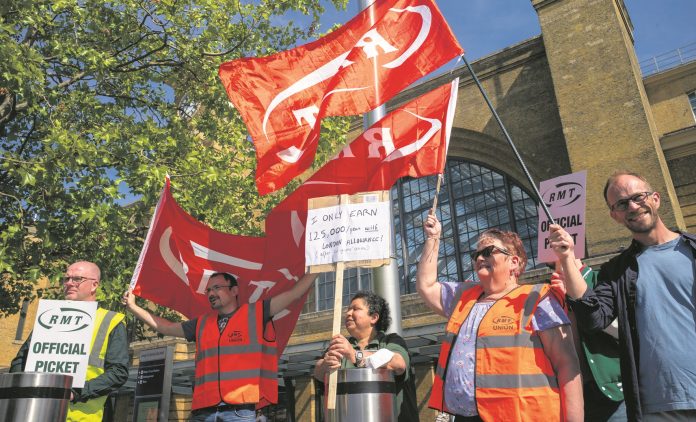West Midlands RMT member
RMT members have voted to accept the ‘Memorandum of Understanding’ offer from the employers’ organisation the Rail Delivery Group (RDG).
Since June 2022, rail unions RMT and Aslef have been at war with the Train Operating Companies (TOCs) who have had the full weight of the Tory government behind them. Aslef remains in dispute and is taking a week of industrial action spread across all the TOCs from 2 December.
The offer has two parts. Part one is a 5% or £1,750 pay rise, whichever is greater, backdated to the 2022 pay anniversary, with supposedly no strings attached. Part two is for the union to enter into discussions with each individual TOC in February 2024, which will aim to negotiate a pay deal for 2023. Many reps will have concerns about this break-up of the national negotiations.
A single vote was taken for both elements, and by accepting the Memorandum the national dispute is now officially terminated. Socialist Party members in the RMT argued to reject.
This result will come as a blow to those RMT reps and activists who worked hard to deliver the tremendous ‘yes’ votes in the reballots in October, which not only smashed the Tory undemocratic minimum turnout thresholds, but in many cases delivered ‘yes’ votes of well over 90%. Six weeks later the dispute is over.
The Memorandum was circulated to members on Wednesday 8 November and the electronic referendum opened just two days later. The leadership put no recommendation for members to accept or reject.
Members had less than 48 hours in order to read and digest the offer before the ballot opened, and there was no time to organise meetings either online or in person before the voting started.
At an online ‘rally’ jointly organised by the RMT’s South West and South Wales and West regions, assistant general secretary John Leach explained the contents of the Memorandum to members, along with the South West’s NEC member. They highlighted that the employers were not offering as much as we would have liked, but that members would be able to have a break from the dispute for a few months, and if necessary ballot in the new year. However, several reps expressed anger at the contents of the offer after we had taken 25 days of strike action.
In one meeting in the Midlands, the unanimous view of the activists present was that the Memorandum was unacceptable and should be rejected. The branch issued a leaflet explaining its position and encouraging members to reject.
However, both meetings took place several days after the ballot opened, which meant that the proverbial horse had already bolted.
Strategy to win
A major factor in the overwhelming vote was that members felt that they were not presented with a credible strategy to win by the leadership. By the time the third reballot took place the strike campaign had diminished to just the odd day. With the managers running a basic scab operation on strike days, it was clear to members that something had to change. In the absence of any significant coordination with Aslef and other trade unions across the wider economy, many members felt it would be best to bank the 5% now and try to make further progress locally in the new year.
Despite making no official recommendation, the RMT leadership has implicitly promoted the offer as having ‘no strings attached’ and delivering substantial backpay. Backpay has been promised to be in members’ bank accounts before Christmas, which will undoubtedly be welcomed.
It would be incorrect to say the dispute has achieved little. Driver Only Operation has been taken off the table, as have mass ticket office closures. The 2022 pay offer has been increased from 2% with strings to 5% or £1,750.
Negotiators in each TOC must now remain focused on the objective of securing an inflation-proof pay rise which makes up for the huge loss in purchasing power over the last two years, and which recognises that we have settled for a real-terms pay cut for 2022.
RMT’s leadership must completely reject the idea that any pay ‘rise’ will be paid for by ‘workplace reforms’ – ie giving away jobs, terms and conditions. This has been explicitly stated in the Memorandum and repeated by employers and Tories in the media.
It should also be emphasised that the ‘no compulsory redundancy’ agreement until the end of 2024 can be withdrawn by the employers if, in the talks beginning in February, we fail to agree the bosses’ ‘workplace reforms’.
We must counter demands for increased ‘productivity’ by exposing that the bosses continue to bleed the railways dry. How ‘productive’ is it that FirstGroup has extracted £129.9 million in dividends to shareholders over the last three years? Or that shareholders of parasitic train-leasing companies like Eversholt enjoyed a profits bonanza of £40 million last year? This is why the union must continue to campaign for renationalisation of the railways.
Although there will be members and activists who are disappointed with the terms of the settlement, the RMT has not been defeated.
The battle for a 2023 pay deal has not yet begun. We can recharge our batteries over the next few months and prepare for re-engagement. Only by showing the bosses that we are still up for the fight can we achieve a just settlement.







